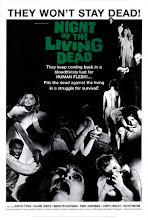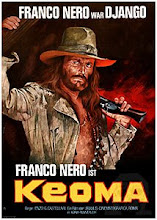
aka Ziab La Ta'kol Al Lahem/“Wolves Don't Eat Meat”
Director/Writer Samir A. Khouri
Cast Ezzat El Ayalla (Anwar), Nahed Sherif (Soraya), Silvana Bader Khan, Liz Sarkisian
 Hola, everyone, and welcome to what could be our strangest excursion yet into World Genre Cinema – a ghoulish, psychedelic sex-horror-crime-political thriller from
Hola, everyone, and welcome to what could be our strangest excursion yet into World Genre Cinema – a ghoulish, psychedelic sex-horror-crime-political thriller from
From a cursory glance at the Internet Movie Database, two films by director Samir A. Khouri appear to be the high water mark of sex and violence in Egyptian cinema and bookend
 Unfortunately for Wolves Don't Eat Meat, the pendulum hadn't swung far enough towards no-holds barred exploitation, and the film was banned for many years. Nasser immediately ordered nude and sex scenes to be trimmed in ALL films so they could be viewed by adults and minors alike, and in 1976 he clamped down on figure-hugging costumes. Against
Unfortunately for Wolves Don't Eat Meat, the pendulum hadn't swung far enough towards no-holds barred exploitation, and the film was banned for many years. Nasser immediately ordered nude and sex scenes to be trimmed in ALL films so they could be viewed by adults and minors alike, and in 1976 he clamped down on figure-hugging costumes. Against
 It's almost nightmare logic which dictates how the film unfolds. It opens with the camera peering down the barrel of an assassin's rifle. After a successful hit from the top of a downtown Kuwait City building, mustachioed Anwar does a mad car chase with the Kuwaiti police with $10 million in stolen Mafia jewels in a case on the front seat, explodes the car, then stumbles blindly with the briefcase through the desert into a mansion wherein all manner of perverse goings-on are happening under a mountain of balloons and bubble-pipes. The elderly patriarch Saleh forces his sword-dancing wife Soraya to step out of her see-through dress and bed down with the wounded assassin, much to the delight of the wheelchair-bound "Auntie". Saleh, meanwhile, is carrying on a secret rendezvous each Thursday with his dead wife's ghost, and "Auntie" wears what looks like a death mask while keeping Soraya pleasured and carrying around a skull in her lap. In this strange house, Death is everywhere, so when Anwar awakens he's perfectly at home. Soraya, we discover, is his long-lost love from his days frequenting strip clubs in
It's almost nightmare logic which dictates how the film unfolds. It opens with the camera peering down the barrel of an assassin's rifle. After a successful hit from the top of a downtown Kuwait City building, mustachioed Anwar does a mad car chase with the Kuwaiti police with $10 million in stolen Mafia jewels in a case on the front seat, explodes the car, then stumbles blindly with the briefcase through the desert into a mansion wherein all manner of perverse goings-on are happening under a mountain of balloons and bubble-pipes. The elderly patriarch Saleh forces his sword-dancing wife Soraya to step out of her see-through dress and bed down with the wounded assassin, much to the delight of the wheelchair-bound "Auntie". Saleh, meanwhile, is carrying on a secret rendezvous each Thursday with his dead wife's ghost, and "Auntie" wears what looks like a death mask while keeping Soraya pleasured and carrying around a skull in her lap. In this strange house, Death is everywhere, so when Anwar awakens he's perfectly at home. Soraya, we discover, is his long-lost love from his days frequenting strip clubs in
 Back in the present, and Anwar and Soraya continue their reunion under the perverted gaze of her husband. Nahed Sherif, one of the golden girls of Egyptian cinema from her first appearance in 1961 til her early death to breast cancer aged 39, certainly isn't shy about taking her clothes off, and during one languid love scene, wipes a clearly traumatized dove sensually across her naked torso. The sex scenes, on the other hand, are much more coy, photographed from across the room, in shadows, or through a rain-streaked window. Blood doesn't seem to pose a problem, either, and director Khouri lays it on as heavy as the overt symbolism; Saleh's death thus comes as a shock when he chokes on a slice of poisoned cheese. A Kuwaiti police inspector, in full dish-dash and headdress, informs Soraya and Saleh's newly-surfaced daughter (a Kuwait Air hostess, if that means anything, Inspector) of their patriarch's demise, and the mystery appears solved - but not before Anwar's final dash through the desert, Kuwaiti police and the Chicago Mafia hot on his tail. The same expressionistic hand-held camera is used as in the opening sequences, giving a gritty, documentary-like counterpoint to the mansion's madly tilted, mescalin-laced visuals.
Back in the present, and Anwar and Soraya continue their reunion under the perverted gaze of her husband. Nahed Sherif, one of the golden girls of Egyptian cinema from her first appearance in 1961 til her early death to breast cancer aged 39, certainly isn't shy about taking her clothes off, and during one languid love scene, wipes a clearly traumatized dove sensually across her naked torso. The sex scenes, on the other hand, are much more coy, photographed from across the room, in shadows, or through a rain-streaked window. Blood doesn't seem to pose a problem, either, and director Khouri lays it on as heavy as the overt symbolism; Saleh's death thus comes as a shock when he chokes on a slice of poisoned cheese. A Kuwaiti police inspector, in full dish-dash and headdress, informs Soraya and Saleh's newly-surfaced daughter (a Kuwait Air hostess, if that means anything, Inspector) of their patriarch's demise, and the mystery appears solved - but not before Anwar's final dash through the desert, Kuwaiti police and the Chicago Mafia hot on his tail. The same expressionistic hand-held camera is used as in the opening sequences, giving a gritty, documentary-like counterpoint to the mansion's madly tilted, mescalin-laced visuals.
 The modest budget of Wolves Don't Eat Meat certainly doesn't suggest a poverty of ideas. There are elements of the kinky Euro-horrors popular at the time - both giallo thrillers, with their endless red herrings and outrageous plot twists, as well as the more traditional gothic horrors - and some seriously perverse Jess Franco-inspired psycho-sexual fantasy. Then there's the commercial hook of
The modest budget of Wolves Don't Eat Meat certainly doesn't suggest a poverty of ideas. There are elements of the kinky Euro-horrors popular at the time - both giallo thrillers, with their endless red herrings and outrageous plot twists, as well as the more traditional gothic horrors - and some seriously perverse Jess Franco-inspired psycho-sexual fantasy. Then there's the commercial hook of





















































































1 comment:
Wonderful review of a tremendous and fascinating film, Andrew. Great job, dude, seriously. Although, according to Pete Tombs there is some dispute to this being exactly an 'Egyptian' film. Although the cast is mostly made up of actors from the 'Hollywood on the Nile', the director was Lebanese and the film shot in Kuwait. It seems as though it may have been made 'on-the-run’ to avoid any sticky political situations. I have a hard time imagining this playing in ANY Middle Eastern country at that time, save perhaps of course for Turkey, but they had their own 'Islamic Psychotronic' films to be bewildered by. Pete also mentioned that Mondo Macabro had investigated putting this and LADY OF THE BLACK MOONS (not nearly as good but still essential viewing) but could not scrape up satisfactory materials. Still, he seemed hopeful that something could happen sometime with this oddball near-masterpiece.
Post a Comment